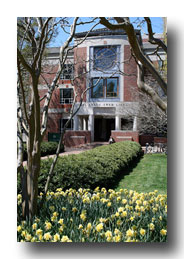
I’d be happier with something like the Blog Advisory System (courtesy of Airbag)…but we’re going to take a pass on the Blogger Code of Conduct for now. Yes, they really have developed badges.
In other news…
 Last week I did the final “before-you-actually-start-class college visit” with my daughter which got me thinking about various college ratings and rankings—there are so many and such variety. Of course, I focus on the tech ratings but even there it depends on who you’re talking to.
Last week I did the final “before-you-actually-start-class college visit” with my daughter which got me thinking about various college ratings and rankings—there are so many and such variety. Of course, I focus on the tech ratings but even there it depends on who you’re talking to.
In the late 90’s to identify tech-savvy schools, you went with Yahoo’s annual “Most Wired Colleges” survey. Lists like that have become passé since everyone’s more or less “wired” yet the temptation to rank persists (see the “Top 20 Wired Colleges” courtesy of PC Magazine and The Princeton Review).
But lists that result from crunching numbers reported by the very sites being ranked have never seemed terribly accurate (e.g., I notice the recent PC Magazine list doesn’t credit Mason with a wireless network). Where to find ratings based on dispassionate, third-party reporting?
How about this?
A few weeks ago the RIAA released their list of the top 25 “violator” schools.
1. Ohio University – 1,287
2. Purdue University – 1,068
3. University of Nebraska at Lincoln – 1,002
4. University of Tennessee at Knoxville – 959
5. University of South Carolina – 914
6. University of Massachusetts at Amherst – 897
7. Michigan State University – 753
8. Howard University – 572
9. North Carolina State University – 550
10. University of Wisconsin at Madison – 513
11. University of South Florida – 490
12. Syracuse University – 488
13. Northern Illinois University – 487
14. University of Wisconsin at Eau Claire – 473
15. Boston University – 470
16. Northern Michigan University – 457
17. Kent State University – 424
18. University of Michigan at Ann Arbor – 400
19. University of Texas at Austin – 371
20. North Dakota State University – 360
21. Indiana University – 353
22. Western Kentucky University – 353
23. Seton Hall University – 338
24. Arizona State University – 336
25. Marshall University – 331
They do love to share music in the heartland, don’t they? What about movies? Fortunately for my research, the MPAA also tracks a top 25:
1,198 Columbia University
934 University of Pennsylvania
891 Boston University
889 University of California at Los Angeles
873 Purdue University
860 Vanderbilt University
813 Duke University
792 Rochester Institute of Technology
765 University of Massachusetts
740 University of Michigan
714 University of California at Santa Cruz
704 University of Southern California
637 University of Nebraska at Lincoln
636 North Carolina State University
586 Iowa State University
575 University of Chicago
562 University of Rochester
550 Ohio University
527 University of Tennessee
506 Michigan State University
457 Virginia Polytechnic Institute
455 Drexel University
447 University of South Florida
405 Stanford University
398 University of California at Berkeley
source: Chronicle of Higher Education, March 30, 2007
Curious about why there’s so little overlap between the RIAA and the MPAA list? I was too but decided I could just assume the schools in the MPAA list had better networking—it takes a good connection to build a video collection of any depth. Not surprising, I found all members of the MPAA list are also members of Internet2. Can’t say the same for the RIAA top 25.
Oh, and that PC magazine list? I found only one school (University of Southern California) on either the RIAA or MPAA lists. Could it be that students at schools on the PC Magazine list are just too smart to get caught? I hope that’s not the case—my alma mater (University of Tennessee) is on both the RIAA and MPAA honor roll.
Digital Campus
My friend Dan Cohen is three episodes into Digital Campus, a podcast focusing on “how digital media and technology are affecting learning, teaching and scholarship at colleges, universities, libraries and museums.†I listened to the first two episodes on my way into work this morning and finished up the third on my way home (you now know I have no life and a long commute). I learned something from each of the episodes and look forward to the next one. As you might expect (given the provenance), there’s a historian’s focus to the discussions but plenty there to interest (and benefit) the e-librarian as well.
Internet Archive / Open Content Alliance
 Brewster Kahle spoke via conference call to the attendees at the Spring meeting of ASERL, talking about the Open Content Alliance, the work of the project and what ASERL libraries can do to help. I’d love to hear from any iNode reader working in a library that’s putting texts (or pdfs) from the Open Content Alliance into their catalog/collection? Seems a no-brainer to me but perhaps I’m missing something.
Brewster Kahle spoke via conference call to the attendees at the Spring meeting of ASERL, talking about the Open Content Alliance, the work of the project and what ASERL libraries can do to help. I’d love to hear from any iNode reader working in a library that’s putting texts (or pdfs) from the Open Content Alliance into their catalog/collection? Seems a no-brainer to me but perhaps I’m missing something.
